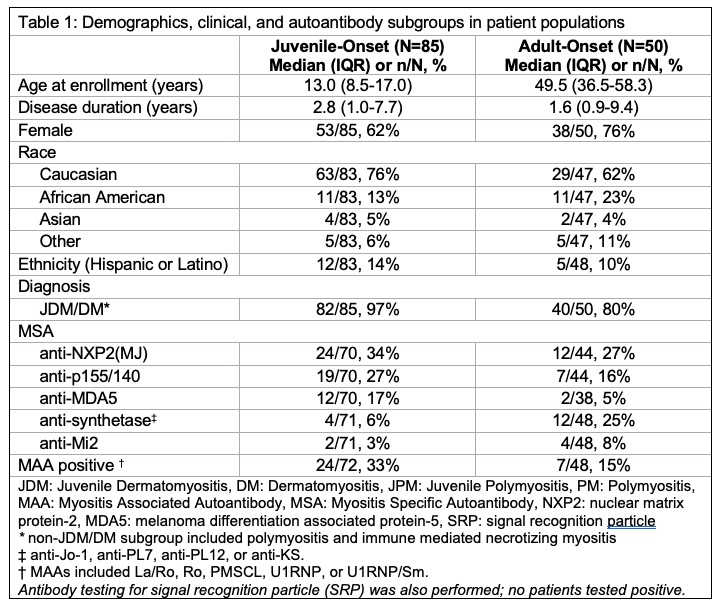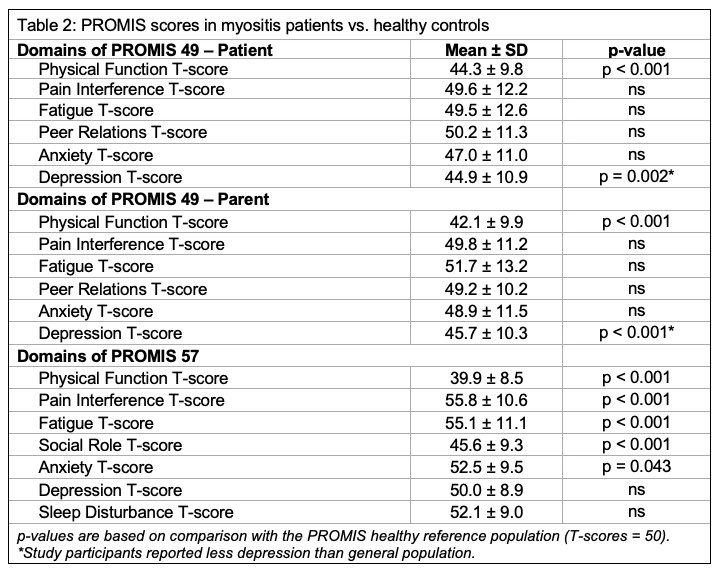Session Information
Date: Wednesday, November 15, 2023
Title: Abstracts: Muscle Biology, Myositis & Myopathies – Basic & Clinical Science II
Session Type: Abstract Session
Session Time: 9:00AM-10:30AM
Background/Purpose: This study aimed to validate the Patient Reported Outcome Measurement Information System (PROMIS) tools in patients with adult and juvenile idiopathic inflammatory myopathies (IIM/JIIM) to better assess quality of life (HR-QoL).
Methods: Seventy-four children and 11 adults with juvenile-onset IIM (mean age 13 years, 62% female) and 50 adult-IIM patients (mean age 50 years, 76% female) with probable or definite Bohan and Peter criteria for IIM enrolled in a myositis natural history study (Table 1). Patients ≥ 18 years of age (n=61) completed PROMIS57, while patients < 18 years (n=49) and/or their parents (n=70) completed PROMIS49. PROMIS domains (Physical Function (PF), Pain Interference (PI), Fatigue, Social Role (SR), Peer Relations (PR), Anxiety, Depression, and Sleep Disturbance) were analyzed for content validity or internal consistency and construct validity, using Pearson’s r and Cronbach’s α. Construct validity of PROMIS was examined in the correlation of PROMIS scores with HAQ/CHAQ and SF-36 as previously studied instruments of HR-QoL.
Results: When compared to the PROMIS healthy reference population, both JIIM patients and their parents reported significantly lower PF, while adult IIM patients reported lower PF, lower SR, and higher PI, Fatigue, and Anxiety scores (Table 2). Pediatric Anxiety scores increased with age (r=0.324, p=0.023), and adult female patients had higher Anxiety scores than adult males (53.9 vs 48.3, p=0.029); there were no other differences in PROMIS scores by demographics. In paired analysis of parent and patient PROMIS scores, parents reported lower PF (p< 0.001), and greater Fatigue (p=0.023) and Anxiety (p=0.032) than their children. All three PROMIS instruments demonstrated “Excellent” or “Good” internal consistency (Cronbach α=0.895 – 0.986) in all domains. None of the PROMIS instruments exhibited floor or ceiling effects, as the majority of patients scored within 2 standard deviations of the mean for all of the domains. PROMIS exhibited strong construct validity using both the HAQ and CHAQ disability index, especially in the PF, PI, and Fatigue domains (r=0.51 – 0.78, p< 0.001). PROMIS57 scores also showed significant correlations with many related SF-36 domains, including PF, PI, and Fatigue (r=|0.840| – 0.85, p< 0.001).
Conclusion: As the first study to analyze many domains of PROMIS in adults with IIM, patients with JIIM, and parents of children with JIIM, our findings emphasize the perceived burden of disease between these populations and suggest that parents perceive poorer health status than their children. Our findings of PROMIS demonstrated excellent internal consistency and correlations with related domains on the HAQ/CHAQ and SF-36. These findings support the incorporation of PROMIS into assessments of IIM/JIIM populations and emphasize the importance of PROMIS to address comprehensive well-being for pediatric and adult patients with these chronic conditions.
To cite this abstract in AMA style:
Austenfeld E, Sabbagh S, Liegl M, Yan K, Fuller J, Rouster-Stevens K, Rider L, Schiffenbauer A. Validation of PROMIS in Adult and Pediatric Patients with Idiopathic Inflammatory Myopathies [abstract]. Arthritis Rheumatol. 2023; 75 (suppl 9). https://acrabstracts.org/abstract/validation-of-promis-in-adult-and-pediatric-patients-with-idiopathic-inflammatory-myopathies/. Accessed .« Back to ACR Convergence 2023
ACR Meeting Abstracts - https://acrabstracts.org/abstract/validation-of-promis-in-adult-and-pediatric-patients-with-idiopathic-inflammatory-myopathies/


